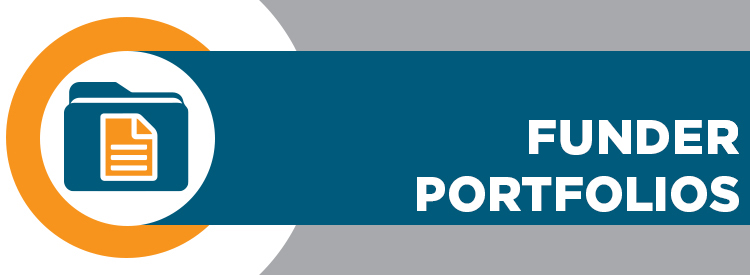Faculty seeking external funding for their research, scholarship, and creative activities have many different options to explore. Each funder has its own distinct mission and culture, funding priorities, and application requirements, all of which can be daunting for potential applicants.
Research Development staff have specialized knowledge about a range of funders, and can help provide shortcuts, develop strategies, and connect applicants with resources that result in stronger applications. Faculty are encouraged to contact the portfolio manager for each funder to get a comprehensive view of available services and resources, including examples of successfully funded proposals.
Explore the links below to learn more about each of these funders. For questions about funders not listed here, please contact Jennifer Webster (jwebster@utk.edu).
Contact Alan Rutenberg (arutenberg@utk.edu) with questions about applying to the ACLS.
The ACLS offers individual fellowships and collaborative and institutional grants for humanities scholars; almost all of these opportunities are available to UT faculty. Unlike the NEH, the ACLS provides no sample narratives, conducts no webinars, and provides no reviews of draft applications. Please note that as of the 2021 competition year, ACLS is requiring all applicants to have an ORCID. All UT applicants must contact their relevant departmental or college staff for information about internal application deadlines and budgets.
Critical Links
Contact Alan Rutenberg (arutenberg@utk.edu) with questions about becoming a Fulbright Scholar.
Fulbright US Scholar awards are only for US faculty members; these awards allow UT faculty members in all fields to spend a semester or year abroad to pursue research, teaching, or a combination of the two. The Fulbright website contains a catalog of awards with detailed information about the awards in each country. Fulbright staff members in the US are assigned to each country and are available for consultations. Prospective applicants should make an appointment by email to have a phone conversation. ORIED has supplementary funds available for especially expensive countries. All UT applicants must contact their relevant departmental or college staff for information about internal application deadlines and budgets.
Critical Links
Contact Hannah Schmidt (hschmidt@utk.edu) with questions about applying to the NEA.
The NEA awards grants to nonprofit organizations, creative writers and translators, state arts agencies, and regional arts organizations in support of arts projects across the country. The primary NEA funding opportunities of interest to UT faculty are Grants for Arts Projects and Our Town Grants. Both opportunities are limited submissions and will have internal competitions to determine the applicants. Institutional cost sharing is required and projects are usually funded at about 50% of the budget request. Applicants are encouraged to review previously funded projects to get a sense of what the NEA supports and contact the program officer to gauge a project’s fit.
Critical Links
Contact Alan Rutenberg (arutenberg@utk.edu) with questions about applying to the NEH.
The NEH offers individual fellowships and collaborative and institutional grants for humanities scholars; almost all of these opportunities are available to UT faculty. Full narratives of selected proposals and webinars appear on the pages for each funding opportunity on the NEH website. Sample budgets are not available. The NEH staff will review draft proposals up to six weeks in advance of the application deadline for most funding opportunities. However, this does not apply to fellowships and summer stipends. All UT applicants must contact their relevant departmental or college staff for information about internal application deadlines and budgets.
Critical Links
Contact ResearchDevelopment@utk.edu with questions about applying to the NIH.
As the nation’s biomedical research agency, the NIH funds research that unlocks fundamental knowledge about the nature and behavior of living systems and applies that knowledge to enhance health, lengthen life, and reduce illness and disability. With 27 distinct institutes and centers and an annual extramural award budget of more than $30 billion, the NIH is a large and complex sponsor that funds a wide range of biomedical research. The primary NIH funding opportunities of interest to UT researchers are the Research Project Grant (R01), the Small Research Grant (R03), the Academic Research Enhancement Award (R15), and the Exploratory/Developmental Research Grant (R21). Before submitting an application, researchers are encouraged to contact an NIH program officer to assess the project’s alignment with sponsor priorities and appropriateness for the target funding opportunity.
Critical Links
Contact Diana Moyer (dmoyer@utk.edu) with questions about applying to the NSF.
NSF is the only federal agency whose mission includes support for all fields of fundamental science and engineering, from mathematics, engineering, and geosciences to biological, behavioral, and computer sciences. NSF funds a broad range of research areas and has multiple levels to its structure (directorates, which contain divisions, which contain programs). Faculty are encouraged to carefully research the best program fit for their research before applying. Some places to start include the NSF awards database and the NSF find funding page. After narrowing down possible programs, faculty are encouraged to confirm project fit by contacting the program officer.
Critical Links
Research Development works closely with partner offices across campus that provide similar services for other types of funders. Examples include:
- Community-Engaged Research
- Defense and Hypersonics Research
- International Research
- Private Foundation Research
